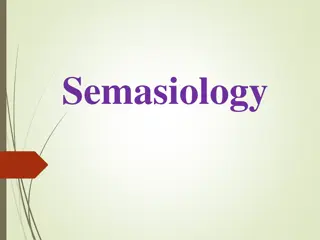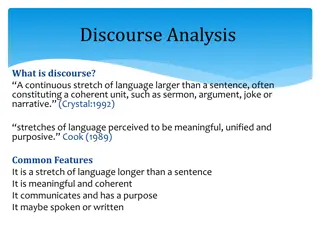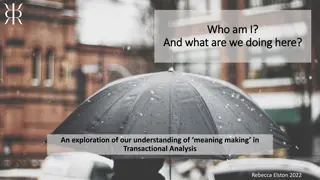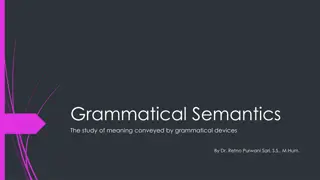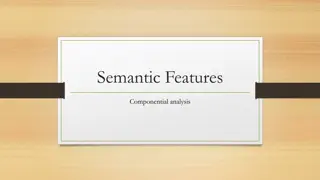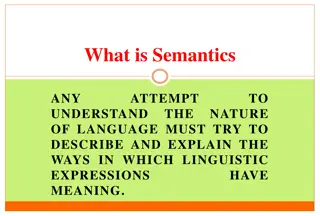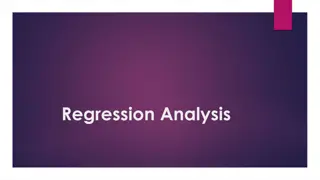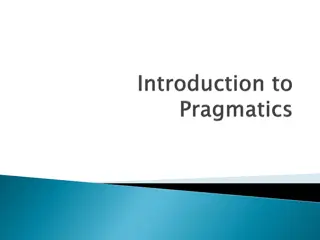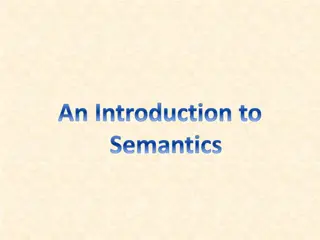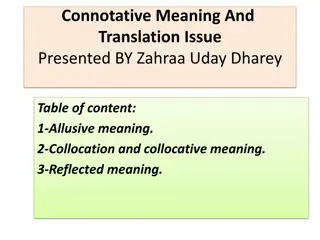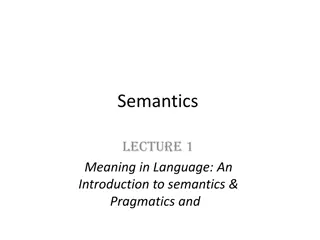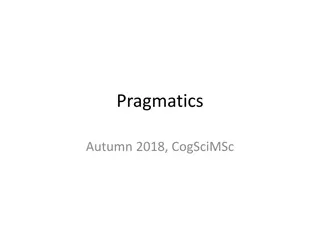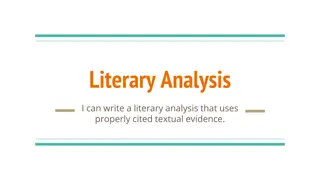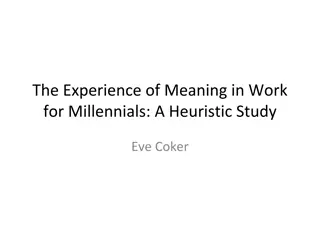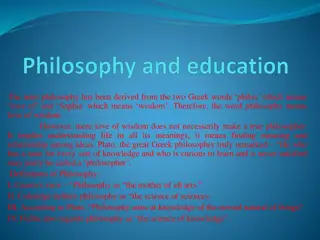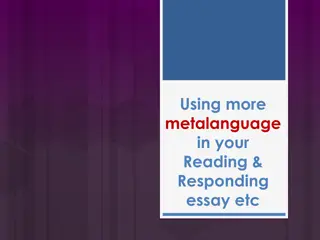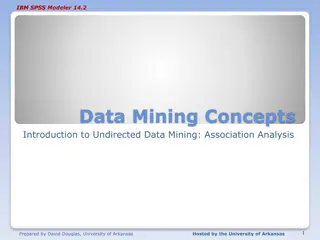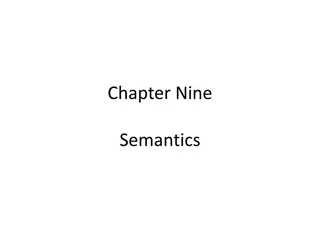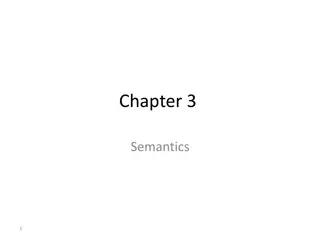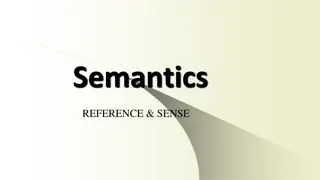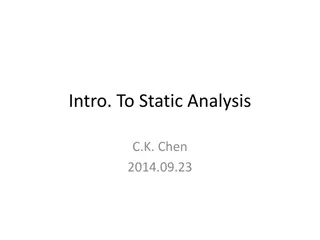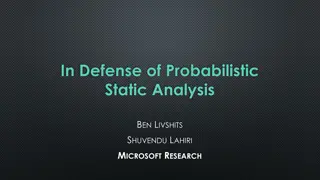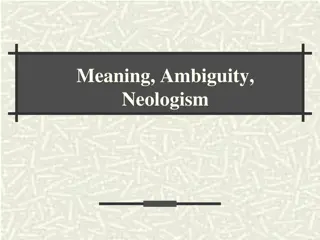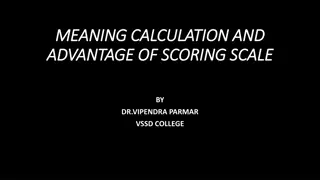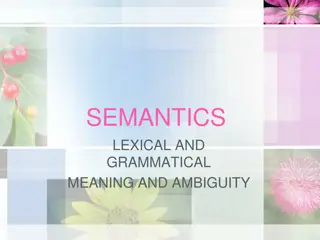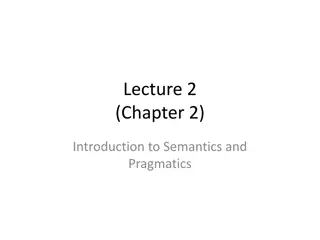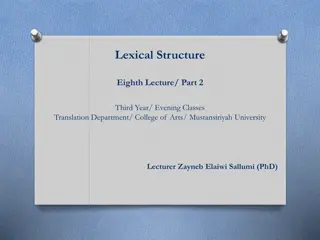Algorithm Analysis
Algorithm analysis involves evaluating the efficiency of algorithms through measures such as time and memory complexity. This analysis helps in comparing different algorithms, understanding how time scales with input size, and predicting performance as input size approaches infinity. Scaling analysi
1 views • 30 slides
Market Analysis (Project Formulation)
This detailed guide covers essential aspects of market analysis and project formulation in entrepreneurship, including feasibility analysis, techno-economic analysis, market demand analysis, steps in market analysis, and factors to consider for market demand analysis. Explore how to assess market de
2 views • 30 slides
Understanding Semasiology: The Study of Word Meaning
Semasiology is a branch of linguistics focused on the meaning of words. It delves into various aspects of lexical meaning, semantic development, polysemy, and semantic structure. Through exploring types of word meanings and semantic changes, semasiology helps us comprehend the intricate nuances of l
4 views • 19 slides
Understanding Semasiology: The Study of Meaning in Language
Semasiology, a branch of lexicology, focuses on the study of meaning in language through different approaches such as the referent approach and functional approach. The referent approach links the sound form with the concept denoted by the word, while the functional approach emphasizes the relations
2 views • 15 slides
Understanding English Morphology: The Study of Words and Meaning
English Morphology delves into the structure of words, exploring morphemes as the building blocks of linguistic meaning. From free morphemes like "certain" to bound morphemes like "-ly," the discipline uncovers how words are constructed and adapted grammatically. By examining the derivational and in
0 views • 49 slides
Comprehensive Cost Management Training Objectives
This detailed training agenda outlines a comprehensive program focusing on cost management, including an overview of cost management importance, cost object definition, cost assignment, analysis, and reporting. It covers topics such as understanding cost models, cost allocations, various types of an
2 views • 41 slides
Understanding Discourse Analysis: Language in Context
Discourse analysis involves examining larger language units beyond sentences, such as conversations, lectures, and written texts, to understand their coherent meaning and purpose within specific contexts. Emerging in the 1970s, this field shifts focus from idealized language structures to the intera
1 views • 47 slides
Exploring Meaning-Making in Transactional Analysis
An exploration of understanding meaning-making in Transactional Analysis by Rebecca Elston in 2022. The discussion revolves around traditional TA concepts, individual connections to place, broadening work frames, and applying Eco TA principles. Key topics include scripts, beliefs about self and othe
0 views • 19 slides
Understanding Grammatical Semantics in Linguistics
Grammatical semantics is the study of meaning conveyed by grammatical devices, exploring the semantics of syntax and morphology. By analyzing sentences about a mouse in the countryside, propositions are identified through a four-step analysis, revealing how meaning is constructed through linguistic
0 views • 17 slides
Understanding Semantic Features in Language Study
Studying basic conceptual meaning is crucial in language analysis to explain the oddness in sentences like "The hamburger ate the boy." Semantic roles and thematic roles help identify the roles of entities in a sentence, such as agents and themes. By analyzing the components of conceptual meaning, w
1 views • 12 slides
Qualitative Data Analysis Techniques in Research
The purpose of data analysis is to organize, structure, and derive meaning from research data. Qualitative analysis involves insight, creativity, and hard work. Researchers play a crucial role as instruments for data analysis, exploring and reflecting on interview discussions. Steps include transcri
1 views • 27 slides
Understanding Semantics: The Study of Meaning in Linguistics
Semantics is the scientific study of meaning in language, delving into questions about definitions, ideas, objects, relations between meanings, and how meanings interact with syntactic rules. Exploring the vagueness of the term "meaning," semanticists explore sense, reference, denotation, and connot
2 views • 19 slides
Understanding Regression Analysis: Meaning, Uses, and Applications
Regression analysis is a statistical tool developed by Sir Francis Galton to measure the relationship between variables. It helps predict unknown values based on known values, estimate errors, and determine correlations. Regression lines and equations are essential components of regression analysis,
0 views • 10 slides
An Exploration of Linguistic Meaning: Semantics and Pragmatics
Delve into the realm of linguistic meaning through the lenses of semantics and pragmatics. Explore how words and phrases carry literal meanings, while language usage in social contexts creates both literal and nonliteral meanings. Uncover the intricate interplay between semantics, concerned with the
5 views • 70 slides
Understanding Semantics: The Study of Meaning in Language
Semantics is the branch of linguistics focusing on meaning, exploring how words, sentences, and symbols convey and represent ideas. It is crucial for language acquisition, change, social contexts, and linguistic analysis. Important aspects include symbol and referent relationships, denotation, conno
0 views • 19 slides
Exploring Connotative Meaning and Translation Issues in Language
Delve into the nuances of connotative meaning through allusive, collocation, and reflected meanings. Discover how translation challenges arise due to cultural nuances and connotations, as exemplified by various expressions and word associations. Explore the significance of appropriate collocations i
0 views • 16 slides
Understanding Evaluation and Ideology in Translation
Evaluation plays a crucial role in the study of translation, influencing both meaning and value in communication. This evaluation is reflected through language elements like accentuation, deletion, and substitution. Appraisal, stance, and evaluation are key terms in linguistic analysis that focus on
2 views • 22 slides
Meaning and Meaning-making in Big Q Qualitative Research
Qualitative research explores different understandings of meaning and meaning-making, providing researchers with tools, techniques, and values. Big Q qualitative research focuses on the active role of words in creating meaning beyond reflecting experiences. This lecture series delves into the founda
1 views • 20 slides
Data Analysis and Passage Analysis Project Proposal
This project proposal by Anthony Yang focuses on developing a Java program for data analysis and passage analysis. The motivation behind the project is to gain more knowledge in computer science and statistics-related topics while utilizing technology to extract useful insights from data. The propos
0 views • 8 slides
Understanding Denotative Meaning and Translation Issues
Denotative meaning in translation poses challenges due to the elastic and indeterminate nature of meaning, especially in dealing with the cognitive or literal sense of words. Polysemy, homonymy, and synonymy contribute to complexities in determining precise denotative meanings. The rigidity and flex
0 views • 40 slides
Exploring the Meaning of Life and Purpose Through Faith and Reflection
Humans are inherently curious, constantly seeking answers to questions about life's meaning and purpose. The journey involves questioning, searching for meaning in various aspects of life, exploring religious beliefs, and engaging in reflective practices.
0 views • 10 slides
Introduction to Meaning in Language: Semantics & Pragmatics
Meaning in language is explored in this introductory lecture, covering aspects such as communication, semiotics, linguistic channels, and approaches to studying meaning. The process of encoding messages, signal transmission, noise interference, and decoding are discussed within the context of commun
0 views • 19 slides
Understanding Pragmatics in Language Analysis
Pragmatics in language analysis involves studying utterance meaning beyond semantics, focusing on context-dependence, complete context-dependence, and pragmatic knowledge. Basic concepts include semantics, discourse, Grice's Relevance Theory, Speech Acts, Metaphor Theory, and more. Truth-conditional
0 views • 47 slides
Dive into Literary Analysis: Understanding the Depths of Textual Meaning
Literary analysis involves dissecting literature to uncover the significance of its parts and how they contribute to the overall meaning. By examining rhetoric and story elements, and exploring the significance and meaning behind the text, readers can gain a deeper understanding of the author's mess
0 views • 10 slides
Understanding Meaning in Work for Millennials: A Heuristic Study
This study explores the experience of meaning in work for millennials, considering its impact on organizational commitment, change, vision-championing, and leadership. It aims to contribute to the existing knowledge base by examining how millennials perceive and create meaning in their work, using q
0 views • 14 slides
Understanding Philosophy: The Search for Wisdom and Truth
The term "philosophy" originates from Greek words meaning "love of wisdom." True philosophy involves seeking meaning and connections among ideas, transcending mere curiosity. Various definitions emphasize philosophy as the foundation of all arts, the science of sciences, and the pursuit of eternal k
0 views • 6 slides
Analyzing Texts: Constructing Meaning with Metalanguage
Explore the construction of meaning in a text through the author's use of metalanguage, examining social, historical, and cultural values embedded within the text. Understand how textual evidence supports analysis and interpretation, recognizing the text's openness to diverse interpretations. Discov
0 views • 20 slides
Introduction to IBM SPSS Modeler: Association Analysis and Market Basket Analysis
Understanding Association Analysis in IBM SPSS Modeler 14.2, also known as Affinity Analysis or Market Basket Analysis. Learn about identifying patterns in data without specific targets, exploring data mining in an unsupervised manner. Discover the uses of Association Rules, including insights into
0 views • 18 slides
Exploring Semantics: Meaning of Words and Concepts
Semantics is the study of the meaning of words, ranging from their basic literal components to their associative connotations. This branch of linguistics focuses on objective meaning shared by all rather than subjective interpretations. Concepts like conceptual and associative meanings are explained
0 views • 22 slides
The Extension Dogma: Exploring Meaning and Extensions in Linguistic Expressions
The Extension Dogma challenges the assumption that linguistic expressions inherently possess meanings. Instead, it posits that expressions have extensions without necessary meanings that determine them. Theories of meaning should focus on the extensions of expressions, while psychological studies of
0 views • 30 slides
Understanding Semantics: Exploring Types and Dimensions of Meaning
Explore the complexities of semantics by delving into the types and dimensions of meaning. From descriptive to non-descriptive meaning, learn how the normality profile of linguistic items contributes to their overall meaning. Distinguish between semantic and grammatical anomalies and discover the nu
0 views • 32 slides
Understanding Semantics: Meaning, Reference, and Sense
Explore the intricate world of semantics through an analysis of meaning, reference, denotation, connotation, and the classification of meaning by G. Leech. Delve into the concepts of conceptual and associative meanings, and understand the importance of sense in expressions. Learn how connotations pl
0 views • 32 slides
Introduction to Static Analysis in C.K. Chen's Presentation
Explore the fundamentals of static analysis in C.K. Chen's presentation, covering topics such as common tools in Linux, disassembly, reverse assembly, and tips for static analysis. Discover how static analysis can be used to analyze malware without execution and learn about the information that can
0 views • 54 slides
Industrial, Microbiological & Biochemical Analysis - Course Overview by Dr. Anant B. Kanagare
Dr. Anant B. Kanagare, an Assistant Professor at Deogiri College, Aurangabad, presents a comprehensive course on Industrial, Microbiological, and Biochemical Analysis (Course Code ACH502). The course covers topics such as Industrial Analysis, Microbiological Analysis, and Biochemical Analysis. Dr. K
0 views • 16 slides
Benefits of Probabilistic Static Analysis for Improving Program Analysis
Probabilistic static analysis offers a novel approach to enhancing the accuracy and usefulness of program analysis results. By introducing probabilistic treatment in static analysis, uncertainties and imprecisions can be addressed, leading to more interpretable and actionable outcomes. This methodol
0 views • 11 slides
Understanding Ambiguity in Translation Theory
Exploring the complexities of ambiguity in translation theory, this content delves into the nuances of meaning, neologisms, and the challenges faced by translators in deciphering text. It discusses the various types of ambiguity, such as lexical and semantic, highlighting their impact on language in
0 views • 27 slides
Understanding Scoring Scales: Meaning, Calculation, and Advantages
Scoring scales are used to assign numerical values to observations for quantifying attributes or behaviors in various fields. They provide a systematic way to evaluate or measure variables, convert qualitative data into quantitative data, and facilitate analysis and interpretation. This article disc
0 views • 22 slides
Understanding Semantics, Lexical, and Grammatical Meaning
Exploring the nuances of semantics, lexical meaning, and grammatical meaning, this content delves into the distinctions between them, the role of lexemes, and the complexities associated with words. It discusses the various kinds of meanings expressed at the lexical and grammatical levels, including
1 views • 37 slides
Introduction to Semantics and Pragmatics: Understanding Meaning in Language
This lecture delves into the fundamental concepts of semantics and pragmatics, exploring the distinction between extension and intension in language meaning. It discusses the relationships between words, the world, and other linguistic elements, emphasizing the importance of sense, denotation, and r
0 views • 13 slides
Understanding Lexical Structure: Antonymy, Hyponymy, and Components
Antonymy refers to words with opposite meanings, divided into gradable and non-gradable categories. Hyponymy involves one term's meaning being included in another. Relational opposites show reversal of relationships, while componential analysis breaks down word meaning into distinct elements.
0 views • 7 slides



